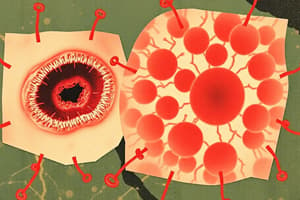Podcast
Questions and Answers
What is hypertrophy?
What is hypertrophy?
- Increase in size and weight of an organ due to a decrease in the number of its cells
- Decrease in size and weight of an organ
- Increase in size and weight of an organ due to an increase in the number of its cells (correct)
- The normal size and weight of an organ
Which type of hyperplasia can occur in any cell type capable of division?
Which type of hyperplasia can occur in any cell type capable of division?
- Compensatory hyperplasia
- Hormonal hyperplasia (correct)
- Physiological hyperplasia
- Localized atrophy
What causes atrophy?
What causes atrophy?
- Decrease in cell size (correct)
- Hormonal stimulation
- Physiological changes
- Increase in cell size
Which type of atrophy occurs after an organ has reached its adult size?
Which type of atrophy occurs after an organ has reached its adult size?
Which type of hypertrophy occurs in pregnant uterus due to hormonal stimulation?
Which type of hypertrophy occurs in pregnant uterus due to hormonal stimulation?
What is the pathological type of hypertrophy that affects the muscle coat of hollow organs due to increased intra-luminal pressure?
What is the pathological type of hypertrophy that affects the muscle coat of hollow organs due to increased intra-luminal pressure?
What is the primary cause of hormonal hyperplasia in repeated anovulatory cycles?
What is the primary cause of hormonal hyperplasia in repeated anovulatory cycles?
Which type of atrophy is characterized by the heart becoming small and the skin becoming wrinkled due to loss of elastic fibers?
Which type of atrophy is characterized by the heart becoming small and the skin becoming wrinkled due to loss of elastic fibers?
What is the mechanism of metaplasia?
What is the mechanism of metaplasia?
Which type of metaplasia involves the transformation of columnar or transitional cells to squamous epithelium?
Which type of metaplasia involves the transformation of columnar or transitional cells to squamous epithelium?
What is leukoplakia?
What is leukoplakia?
What is the primary cause of neuropathic atrophy?
What is the primary cause of neuropathic atrophy?




